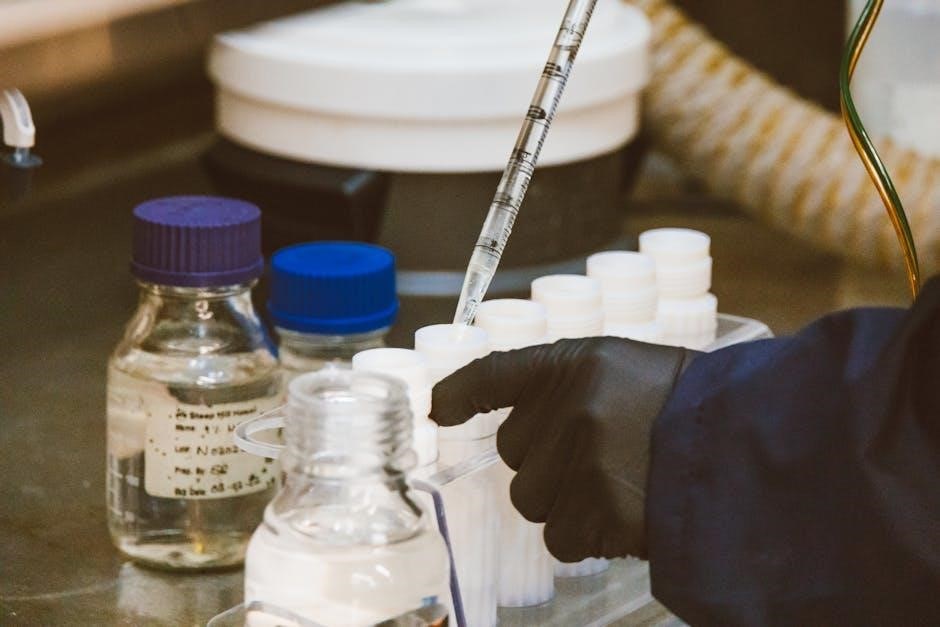PDF Solutions is a leader in semiconductor analytics, offering advanced tools like eProbe for defect inspection and process optimization, enhancing manufacturing efficiency, yield, and innovation.
1.1 Overview of PDF Solutions and Its Role in Semiconductor Analytics
PDF Solutions is a leading provider of semiconductor analytics, empowering the industry with advanced tools like eProbe to enhance manufacturing efficiency. Specializing in defect detection, process optimization, and yield improvement, PDF Solutions offers comprehensive data analytics solutions. Its eProbe system plays a pivotal role in identifying nanometer-level defects, accelerating learning cycles, and integrating seamlessly with platforms like Exensio for enhanced process control. By enabling precise defect inspection and advanced data insights, PDF Solutions drives innovation and quality in semiconductor manufacturing, addressing the demands of cutting-edge technology nodes.
1.2 The Importance of eProbe in PDF Solutions’ Portfolio
eProbe stands as a cornerstone in PDF Solutions’ portfolio, offering cutting-edge e-beam technology for defect inspection and voltage contrast measurements. Its advanced capabilities in detecting nanometer-level defects and integrating with the Exensio platform make it indispensable for semiconductor analytics. eProbe’s high throughput and precision enhance process control, accelerate learning cycles, and improve yield. As a key innovation, it underscores PDF Solutions’ commitment to advancing semiconductor manufacturing, ensuring the delivery of high-quality chips in demanding technology nodes.
What is eProbe?
eProbe is PDF Solutions’ advanced e-beam system designed for defect inspection and voltage contrast measurements, enabling precise semiconductor analysis and process optimization at nanometer levels.
2.1 Definition and Purpose of the eProbe System
eProbe is an advanced e-beam system developed by PDF Solutions for defect inspection, voltage contrast measurements, and process optimization in semiconductor manufacturing. It leverages cutting-edge e-beam technology to identify defects at nanometer levels, ensuring high precision and efficiency. The system is designed to accelerate learning cycles and improve yield by providing detailed insights into wafer-level defects. Its integration with PDF Solutions’ Exensio platform enhances data analytics, enabling comprehensive process control and optimization.
2.2 Key Features of the eProbe 250 and eProbe 450 Systems
The eProbe 250 and eProbe 450 systems offer advanced e-beam technology for defect inspection and voltage contrast measurements. The eProbe 250 features vector scanning mode for efficient defect detection, while the eProbe 450 integrates seamlessly with PDF Solutions’ Exensio platform for enhanced data analytics. Both systems provide high throughput, precision, and sensitivity, enabling detailed defect analysis and process optimization in advanced semiconductor manufacturing. Their unique capabilities ensure accelerated learning cycles and improved yield in nanometer-level technology nodes.
Technology Behind eProbe
eProbe employs advanced e-beam inspection, voltage contrast (VC) measurements, and vector scanning mode to enable precise defect detection and analysis in semiconductor manufacturing processes.
3.1 Advanced e-Beam Inspection and Voltage Contrast (VC) Measurements
The eProbe system leverages cutting-edge e-beam technology to perform advanced voltage contrast (VC) measurements, enabling precise detection of electrical defects in semiconductor devices. By utilizing vector scanning mode, the system optimizes measurement efficiency, dedicating all e-beam time to critical areas. This capability is crucial for identifying defects in advanced technology nodes, ensuring high throughput and accuracy in defect inspection. The integration of VC measurements allows for detailed analysis of electrical activity, making eProbe indispensable in modern semiconductor manufacturing processes.
3.2 Vector Scanning Mode for Enhanced Measurement Efficiency
The eProbe system employs vector scanning mode to enhance measurement efficiency, focusing the e-beam exclusively on critical areas of interest. This method eliminates redundant scanning, significantly speeding up defect detection and analysis. By optimizing scan patterns, vector scanning mode ensures high throughput while maintaining precision, making it ideal for advanced semiconductor nodes like 4nm. This approach accelerates defect identification and reduces inspection time, contributing to faster learning cycles and improved manufacturing yield in complex semiconductor processes.

Applications of eProbe in Semiconductor Manufacturing
eProbe is critical for defect detection, analysis, and accelerating learning cycles in advanced semiconductor nodes, improving efficiency and yield in high-volume manufacturing environments.
4.1 Defect Inspection and Analysis in Advanced Technology Nodes
eProbe excels in defect inspection and analysis for advanced semiconductor nodes, enabling precise detection of nanometer-level defects. Its voltage contrast and vector scanning capabilities ensure high-resolution imaging, crucial for identifying faults in complex 4nm FinFET and beyond technologies. High throughput allows for in-line inspection, maintaining quality and reducing defects in high-volume manufacturing. This ensures faster identification and resolution of issues, enhancing overall yields and reliability in cutting-edge semiconductor production.
4.2 Accelerating Learning Cycles in Chip Development
eProbe significantly accelerates learning cycles in chip development by enabling rapid defect identification and analysis. Its advanced e-beam technology provides detailed insights into process variations, allowing engineers to refine designs and manufacturing steps quickly. This reduces development time and improves time-to-market. Integration with PDF Solutions’ Exensio platform further enhances data-driven decision-making, enabling faster iteration and optimization of semiconductor processes, ultimately driving innovation and efficiency in chip production.

Integration with PDF Solutions’ Exensio Platform
eProbe’s integration with PDF Solutions’ Exensio platform ensures seamless data flow, enabling comprehensive analytics and enhancing process control for improved semiconductor manufacturing efficiency and yield optimization.
5.1 Seamless Data Flow for Comprehensive Analytics
The integration of eProbe with PDF Solutions’ Exensio platform enables seamless data flow, ensuring real-time insights and comprehensive analytics. This connectivity allows for automated defect detection, process monitoring, and yield optimization. By streamlining data exchange, eProbe enhances the accuracy and speed of decision-making, enabling manufacturers to identify and address issues promptly. This integration is critical for maintaining high-efficiency production processes and ensuring the quality of advanced semiconductor devices.
5.2 Enhancing Process Control and Yield Improvement
eProbe’s integration with Exensio enables real-time process control by providing actionable insights into defect detection and yield optimization. By leveraging advanced analytics, manufacturers can identify and correct process deviations early, reducing variability and improving overall yield. The seamless flow of data between eProbe and Exensio ensures comprehensive monitoring and optimization, making it a critical tool for enhancing semiconductor manufacturing efficiency and product quality.

Market Adoption and Customer Success Stories
eProbe has gained significant traction in the semiconductor industry, with leading companies adopting the platform. Successful evaluations and implementations highlight its effectiveness in improving manufacturing processes.
6.1 Case Studies of eProbe Implementation in Leading Semiconductor Companies
Leading semiconductor companies have successfully integrated eProbe systems, achieving reduced defect rates and faster learning cycles. For instance, a prominent chipmaker utilized eProbe 250 to enhance 4nm node yields. Another major foundry adopted eProbe 450, improving process control through seamless integration with Exensio platform. These case studies demonstrate eProbe’s pivotal role in advancing nanometer-level manufacturing efficiency and quality across the industry.
6.2 Customer Feedback and Evaluation Results
Customers have praised eProbe’s high throughput and precision, with one evaluation completed ahead of schedule. Feedback highlights its effectiveness in defect detection and seamless integration with Exensio. Many report improved process control and faster learning cycles. eProbe 250’s performance in 4nm nodes has been particularly commendable, showcasing its value in advanced manufacturing. Overall, eProbe has earned strong industry recognition for enhancing semiconductor inspection and manufacturing efficiency.

Competitive Advantages of eProbe
eProbe excels with high throughput, precision, and its unique Design-for-Inspection (DFI) system, enabling advanced defect detection and seamless integration with PDF Solutions’ Exensio platform for superior process control.
7.1 High Throughput and Precision in Defect Detection
eProbe’s advanced e-beam technology ensures high throughput and precision, enabling rapid and accurate defect detection across nanometer-level technology nodes. Its vector scanning mode optimizes measurement efficiency, dedicating full beam time to critical areas, thus enhancing overall inspection speed without compromising accuracy. This capability is crucial for maintaining quality in demanding semiconductor manufacturing environments, where even minute defects can impact performance.
7.2 Unique Design-for-Inspection (DFI) System
PDF Solutions’ proprietary Design-for-Inspection (DFI) system is a groundbreaking innovation that enhances defect detection and process optimization. This unique system integrates seamlessly with the eProbe platform, enabling precise electrical response measurements through on-chip instruments. By dedicating the e-beam to critical areas, DFI improves inspection efficiency and accuracy, particularly in advanced nodes like 4nm FinFET. This integration accelerates learning cycles and ensures higher manufacturing yields, making DFI a pivotal tool in modern semiconductor manufacturing.

Future Developments and Innovations
PDF Solutions plans to enhance the eProbe platform with advanced defect detection capabilities and tighter integration with the Exensio platform, supporting next-gen semiconductor manufacturing needs.
8.1 Upcoming Enhancements to the eProbe Platform
PDF Solutions is developing next-gen eProbe systems, including the eProbe 550, to address 3nm and 2nm node challenges. Enhanced vector scanning modes and AI-driven analytics will improve defect detection accuracy and speed. Integration with Exensio will enable real-time process control and predictive maintenance, ensuring faster yield optimization. These advancements aim to support the semiconductor industry’s shift toward smaller, more complex nodes while maintaining high throughput and precision.
8.2 PDF Solutions’ Roadmap for Advanced Semiconductor Tools
PDF Solutions is committed to advancing semiconductor tools through continuous innovation. Their roadmap includes developing next-gen eProbe systems, such as the eProbe 550, tailored for 3nm and 2nm nodes. Enhanced vector scanning modes, AI-driven analytics, and tighter integration with the Exensio platform are key focus areas. These advancements aim to support the industry’s transition to smaller, more complex nodes, ensuring high-efficiency defect detection and process optimization. PDF Solutions’ roadmap underscores its leadership in enabling cutting-edge semiconductor manufacturing.

Industry Impact and Trends
The semiconductor industry demands advanced tools like eProbe to address nanometer-level challenges. Its integration with Exensio enhances defect detection, driving innovation and industry-wide yield optimization.
9.1 The Growing Demand for Advanced Inspection Tools in the Semiconductor Industry
The semiconductor industry faces escalating demands for advanced inspection tools due to shrinking technology nodes and complex manufacturing processes. As chips reach 3nm and below, defects become harder to detect, driving the need for high-precision systems. PDF Solutions’ eProbe systems, with their cutting-edge e-beam technology, address this challenge by offering high sensitivity and speed, enabling manufacturers to maintain quality and reliability in high-volume production; This trend underscores the critical role of innovative inspection tools in sustaining industry growth and competitiveness.
9.2 eProbe’s Role in Addressing Challenges of Nanometer-Level Manufacturing
eProbe addresses nanometer-level manufacturing challenges through advanced e-beam technology and non-contact inspection, ensuring high precision without damaging delicate structures. Its high throughput and integration with PDF Solutions’ Exensio platform enable efficient defect detection and data-driven process optimization, enhancing yield and reducing costs in cutting-edge semiconductor production, particularly for nodes like 4nm FinFET, where defect control is critical.
eProbe is a transformative solution in semiconductor analytics, enabling precise defect detection and process optimization. Its integration with Exensio enhances manufacturing efficiency and precision, driving industry advancement.
10.1 Summary of eProbe’s Significance in PDF Solutions’ Ecosystem
eProbe is a cornerstone of PDF Solutions’ ecosystem, enabling advanced defect detection and process optimization. Its integration with Exensio enhances data analytics, accelerating learning cycles and improving yield. By providing high-precision inspection and unique DFI capabilities, eProbe addresses critical challenges in nanometer-level manufacturing. Its role in driving innovation and efficiency solidifies PDF Solutions as a leader in semiconductor analytics, empowering manufacturers to achieve higher quality and profitability in chip production.
10.2 The Future of Semiconductor Inspection with eProbe
eProbe is poised to revolutionize semiconductor inspection by advancing defect detection and process control. Future enhancements will focus on improving measurement capabilities and integrating AI-driven analytics. With its DFI system, eProbe will enable seamless data flow, supporting next-gen technology nodes like 3nm and beyond. As the semiconductor industry evolves, eProbe will remain a critical tool for ensuring quality and efficiency, driving innovation and growth in the global chip manufacturing ecosystem.

Be First to Comment